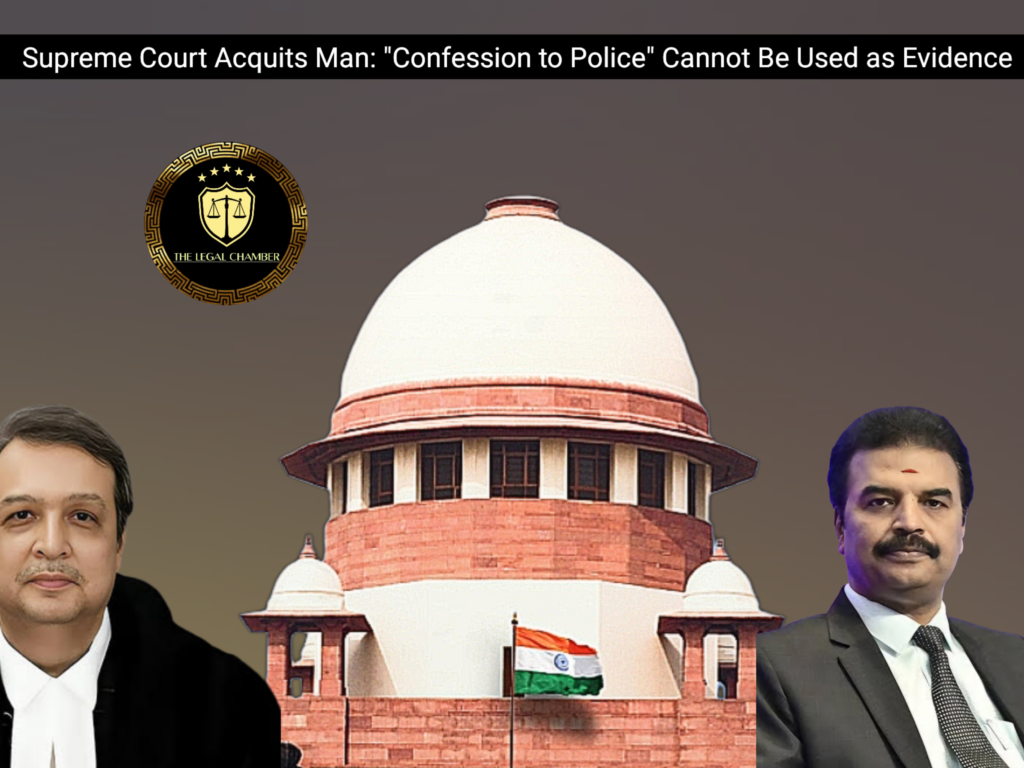
The Supreme Court acquitted the accused, holding that a confessional FIR made to a police officer is wholly inadmissible as evidence under Section 25 of the Indian Evidence Act, 1872. The prosecution failed to prove its case with legally admissible evidence, rendering the medical and other evidence insufficient for conviction.
Facts Of The Case:
The appellant, Narayan Yadav, himself lodged an FIR at Korba Kotwali Police Station on 27.09.2019, confessing to the murder of Ram Babu Sharma. In the FIR, he stated that a quarrel ensued at the deceased’s residence after the latter made an obscene remark upon seeing a photograph of the appellant’s girlfriend. In a fit of rage, the appellant claimed he picked up a vegetable knife and inflicted injuries on the deceased, later also hitting him with a wooden log. He then ransacked the room, stole cash and car keys, and fled in the deceased’s Bolero vehicle, which was later involved in an accident. The investigation commenced based on this FIR. The dead body was discovered inside the locked house, and a post-mortem examination confirmed homicidal death caused by incised wounds, including one that lacerated the lung. The appellant was arrested, and certain recoveries, including his blood-stained clothes, were made at his instance. The Trial Court convicted him under Section 302 IPC and sentenced him to life imprisonment. The High Court partly allowed his appeal, altering his conviction to Section 304 Part I IPC, granting him the benefit of Exception 4 to Section 300 IPC. The appellant then appealed to the Supreme Court.
Procedural History:
The case originated with the conviction of the appellant under Section 302 of the Indian Penal Code by the Sessions Judge, Korba, who sentenced him to life imprisonment based on the evidence presented, including his confessional FIR. Aggrieved by this decision, the appellant filed Criminal Appeal No. 1538 of 2021 before the High Court of Chhattisgarh. The High Court, vide its impugned judgment dated 16.01.2025, partly allowed the appeal. It altered the conviction from Section 302 IPC to the lesser offence of culpable homicide not amounting to murder under Section 304 Part I IPC, extending the benefit of Exception 4 to Section 300 IPC. Subsequently, the appellant filed a Special Leave Petition (SLP (Cri.) No. 10595 of 2025) before the Supreme Court of India, challenging the conviction itself. The Supreme Court granted leave and, upon hearing the criminal appeal, acquitted the appellant of all charges.
READ ALSO :Supreme Court Settles the Law: A Person Not Named in Police Report Can Still Be Summoned to Face Trial
Court Observation:
The Supreme Court made several critical observations, fundamentally centering on the inadmissibility of evidence. It held that a confessional First Information Report (FIR) made to a police officer is completely barred from being used as evidence against its maker under the mandate of Section 25 of the Indian Evidence Act, 1872. The Court found the High Court had committed a grave error by using the contents of this inadmissible confessional FIR to corroborate the medical evidence. It further observed that the evidence of an expert witness, like a doctor, is merely advisory in nature and cannot, by itself, form the sole basis for a conviction. The Court also noted that the prosecution failed to legally prove any discoveries or facts at the instance of the appellant that were admissible under Section 27 of the Evidence Act. Lastly, it opined that the High Court incorrectly applied Exception 4 to Section 300 IPC, as the unilateral and brutal assault by an armed appellant on an unarmed deceased did not constitute a “sudden fight” and instead indicated the offender had taken undue advantage.
Final Decision & Judgement:
The Supreme Court allowed the appeal and set aside the impugned judgment of the High Court. Consequently, the appellant, Narayan Yadav, was acquitted of all charges. The Court directed that he be set free forthwith, provided he is not required in any other case. The bail bonds, if any, were discharged. This final decision was based on the conclusion that the prosecution had failed to prove its case with legally admissible evidence, as the entire foundation of the conviction rested on an inadmissible confessional FIR and insufficient corroborative material.
Case Details:
Case Title: Narayan Yadav vs. State of Chhattisgarh Citation: 2025 INSC 927 Criminal Appeal No.: Criminal Appeal No. 3343 of 2025 (Arising out of SLP (Cri.) No. 10595 of 2025) Date of Judgement: 5th August 2025 Judges/Justice Name: Justice J.B. Pardiwala and Justice R. Mahadevan
Download The Judgement Here